

2015 brought with it many creative and colorful installations and exhibits by artists from around the world. Many of the artists took us on a journey to a world occurrence or event that impacted them so deeply, it behooved them to share in the only way they knew how – through their art. It is through art that we visited New York’s other half, affordable housing, and how gentrification has changed our communities. Or how we might handle urban density, brought attention to the faces of the homeless, and looked back at the people who arrived on our shores, with hope for a better life. We viewed our lives in photographs from the street to the sky. Global and local news transformed into art in ways that caught our attention, as with the plight of the Syrian refugees shown through art at Trinity Church.
Moving into the New Year, you will see artistic works on such topics as the doors opening in Cuba, sustainability, ecology, mass incarceration, economic inequality, and our waterfront redevelopment. There will be discussions on the value of food in the form of art, from what we have tossed aside to what we will create on our rooftops. In the end, share a meal and stand beside a giant figure “Looking Up” to the sky in a whimsical and thoughtful way.
Many of these exhibits and installations will close early in the month. Be sure to check closing dates.
16. The First St. Patrick’s Day Parade in Cuba
With St. Patrick’s Day right around the corner, we are reminded that the tradition of this parade began with Irishmen serving oversees throughout the centuries. Many of them remained in the countries where they served and called home. Parades helped keep traditions alive.
In 2007, the artist Duke Riley visited Havana and discovered his own Irish roots researching prominent historical figures of Irish-Cuban descent and even finding a street named Calle O’Reilly. Inspired by his findings, he set about to stage the first St. Patrick’s Day Parade in Havana at Museum Nacional de Bellas Artes as part of the Havana Biennial 2009. A large billboard was created as a record of this performance, which included American cartoon characters marching through the streets of Havana. On exhibit at Socrates Sculpture Park is a section of that billboard, in the installation titled “El Primero Desfile de San Patricio en la Habana, Cuba (The First St. Patrick’s Day Parade in Havana, Cuba).
Broadway Billboard: Duke Riley will be on view through March 13, 2016. Also on view is the EAF15: 2015 Emerging Artist Fellowship Exhibit, on view through March 13, 2016.
15. Agitprop! at The Brooklyn Museum
Our country has a deep history of working toward social change and greasing that squeaky wheel known as “agitating,” not only through marches and rallies, but also through art. The three-part exhibit “Agitprop!” at the Brooklyn Museum presents creative activism in diverse and artistic ways including photography, film print, banners and dialogue. The exhibit began with the works of twenty contemporary artists, concentrating on five historical studies, on December 11. The second group of artists take the helm on February 17, and the third on April 6. Each group of artists has chooses the next group.
The exhibit, organized by the staff of the Elizabeth A. Sackler Center for Feminist Art, highlights social injustice and the struggles from women’s suffrage to mass incarceration and economic inequality. In addition to the exhibit, there is a wide-ranging calendar of related events. Agitprop! will be on view through August 7, 2016 at the Brooklyn Museum, 200 Eastern Parkway.
14. Artist Naima Rauam Documenting The Fulton Fish Market
Artist Naima Rauam has been documenting the South Street Seaport in watercolor since the early 1980s. She once shared space with Meyer & Thompson Smoked Fish Company on Beekman Street, where she lived and worked alongside the cod and smoked fish. In 1984, the ground-floor sales area became her first studio. It was called “Art in the Afternoon,” since she could only paint and show her work after the fishmongers left. The building was sold in 1977, when she moved to the landmark Tin Building, where she painted until the Fulton Street Fish Market moved in 2005.
A decade after the relocation of the Fulton Street Fish Market, Ms. Rauam couldn’t let the year close without a nod to its history and the memories left behind. Her exhibit titled “10th Anniversary, Remembering Fulton Fish Market” is made up of her original watercolors, charcoals, pencil drawings and prints of the South Street Seaport area over the past ten years.
The exhibit is located at Fulton Stall Market, 207A Front Street, near Beekman Street, on view from noon to 6 pm through January 10. Her work can also be found in public and private collections including the Smithsonian Institution, National Air & Space Museum, American Merchant Marine Museum and many more.
13. Tom Friedman Brings “Looking Up” to Park Avenue

Untapped Cities has often encouraged readers “Don’t Forget to Look up.” So when we heard that Tom Friedman’s whimsical thirty-three foot tall figure titled “Looking Up” was heading to New York, we craned our necks to learn more. “Looking Up” is part of a series which includes “Looking Up” 2012, first seen in London at just over thirty-three inches tall. An earlier version featured the figure relieving himself in a corner. “Looking Up” 2015 is among the largest of these works, and was acquired by The Contemporary Austin. New York will be receiving a similar thirty-three foot sculpture in January.
Initially carved from rudimentary styrofoam, the sculpture is covered in crushed aluminum foil roasting pans, and molding created for lost wax casting. The figure is then converted to stainless steel. Friedman’s rep and Director at the Luhring Augustine, Lauren Wittels, said that “Looking Up” will provide New Yorkers with “a center of respite and contemplation in the midst of an exceptionally busy and hectic part of town.” The figure gazes up to the sky with a look of both awe and surprise. Looking up can have a different meaning to different people in different countries, but in the end, we are all looking up at the same sky. The artist hopes that you will join the figure in looking up with the same feeling of whimsy and wonder as his installation.
“Looking Up” will be on view from late January through June 2016, located on Park Avenue between 53rd and 54th Streets.
12. Artist Mazeredo Brings Dialogue to Dag Hammarskjold Plaza
This site-specific installation titled “Dialogue” created by the Brazilian artist Mazeredo consists of four sculptures meant to unite a diverse population in discourse, with a view toward peaceful resolution of conflicts. They are meant to be viewed from left to right, and are titled Communication, Dialogue, Babel and Butterfly. While the colors look like they were created for the holiday season, they actually are made to represent different cultures, views, and values. They symbolize the heated debates on social issues and politics between countries at the neighboring United Nations Headquarters. The artist said that she is “honored to bring these pieces to the Dag Hammarskjold Plaza, where people regularly assemble to make their voices heard.” The installation is presented by Friends of Dag Hammarskjold Plaza and NYC Parks.
“Dialogue” will be on view through May 1, 2016 at the Dag Hammarskjold Plaza located at East 42nd Street between 1st and 2nd Avenues.
#11. The Heatherwick Studio Exhibit at Cooper Hewitt
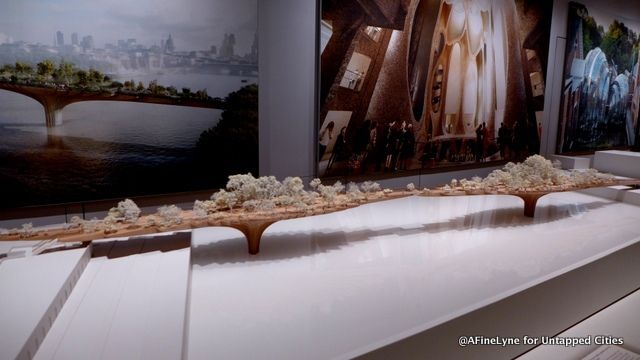
Garden Bridge, London, 2012 proposal for pedestrian bridge across London’s Thames River
Cooper Hewitt has an exhibit showcasing the work of British designer Thomas Heatherwick and his London-based studio. They have been very much in our news lately, for their design work on the futuristic 2.7 acre park being developed off Pier 55. The exhibit brings to life countless unique design concepts throughout the world, from glass and moveable bridges, to unusual buildings and handbags designed for Longchamp. On display is a model of the Learning Hub at Singapore’s Nanyang Technological University, the redesign of London’s double-decker buses, known as the new Routemaster, demonstrations of the Rolling Bridge in London, and a look at the Spun Chair, which resembles a spinning top.
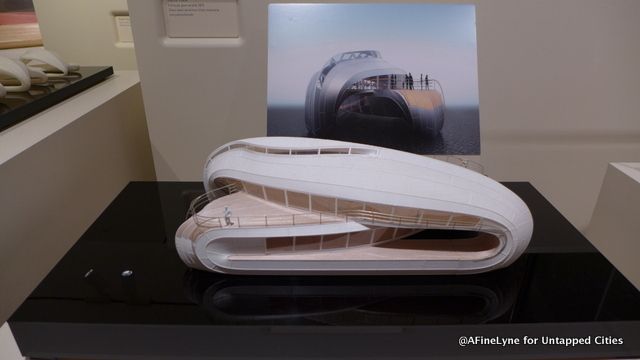
Vessel built from single hull for the Mayor of Nante, France
The exhibit “Provocations: The Architecture and Design of Heatherwick Studio” was organized by the Nasher Sculpture Center and will be on view through January 3, 2016. Cooper Hewitt is located at 2 East 91st Street, on Fifth Avenue.
#10. Chance Ecologies Exhibit at Radiator Gallery
“Chance Ecologies: The Wild Landscapes of Hunter’s Point South,” an exhibition at Radiator Gallery in Long Island City, presents art inspired by an abandoned post-industrial property that is now being redeveloped along the Queens waterfront. Chance Ecologies is an experimental art organization exploring the value of wild places in a changing city. In August, we walked the landscape in question with the team of Chance Ecologies, and we’re excited to see the artistic output from their work this year.
Examples of work on display include a poster illustrating some of the wild plants found in the area and a photo typology of the “endangered surfaces” to be lost as the area becomes a new neighborhood of streets, buildings, and landscaped parkland.
About 17 artists are featured in the current exhibition at Radiator Gallery, which runs through January 22, 2016. This exhibit will be followed by another one next autumn at the Queens Museum of Arts. Radiator Gallery, part of Radiator Arts, is located at 10-61 Jackson Avenue, Long Island City, Queens, NYC. The exhibit is open Fridays and Sundays, 1 to 6 pm and by appointment, along with upcoming Chance Ecologies events.
9. The Value of Food at Cathedral of St. John the Divine
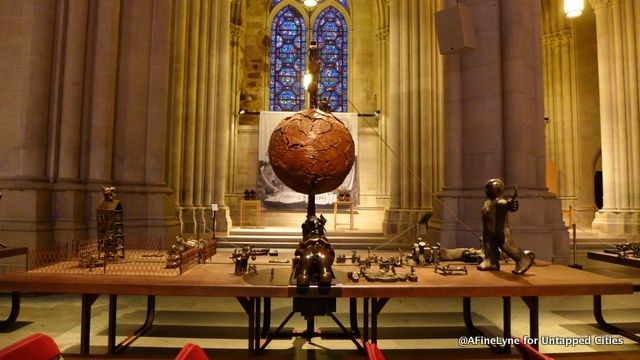
One of three tables of sculptures by Tom Otterness at The Value of Food exhibit
“The Value of Food: Sustaining a Green Planet” can be found in every corner, high and low, of the Cathedral of St. John the Divine. The exhibit is divided into seven thematic sections: Water, Soil, Seed, Farm, Market, Meal and Waste. Each represents a part of food production. The exhibit consists of paintings, sculptures and multimedia created by thirty-two renowned artists, including Kara Walker and Tom Otterness. They explore how food impacts individuals physically, mentally and spiritually, and looks at various methods including rooftop farming, composting and sharing meals. The work is installed all over the cathedral, including the main altar, where you will find Christy Rupp’s sculpture “Extinct Birds” made of chicken bone fragments collected from restaurant garbage bins. You will find the artwork in the most amazing places, so be sure to use the map.
“The Value of Food: Sustaining a Green Planet” is located inside the Cathedral of St. John the Divine located at 1047 Amsterdam Avenue at 112th Street. The cost is free, with a suggested donation of $10. The exhibit will be on view through April 3, 2016.
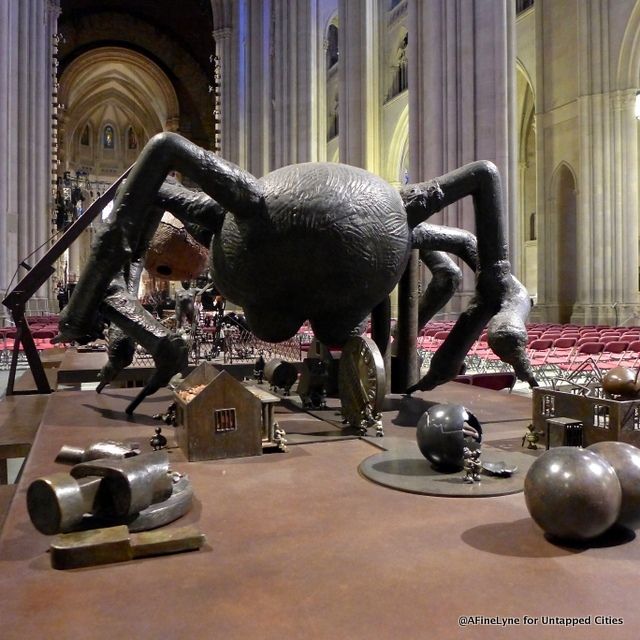
A second farm table holding the work of Tom Otterness in “The Value of Food” exhibit
8. Artist Wendy Klemperer Brings Shadow Migration to Court Square Park
“Shadow Migration” by Wendy Klemperer. Image via NYC Parks
Steel-form silhouettes of animals can be found throughout Court Square Park in Long Island City. Through this installation, “Shadow Migration,” artist Wendy Klemperer investigates animal populations threatened in the twentieth-century, the way they have adapted to their environment, and how they are thriving now. Her diverse selection of animals is a representation of the diverse community living in Queens today. Ms. Klemperer was the recipient of the 2015 Clare Weiss Emerging Artist Award. The $10,000 award, which is granted annually, is named in memory of Clare Weiss, Parks’ Curator of Public Art from 2005-2009.
“Shadow Migration” will be on view through November 7, 2016 at Court Square Park off Jackson Avenue and Thomson Avenue in Long Island City.
7. Artist Juan Hinojosa Creates Blonde Ambition at Materials for the Arts
On the heals of our holiday gift giving, the artist Juan Hinojosa explores the concept of consumerism and the power of brand logos in his colorful exhibit “Blonde Ambition.” The result of a four-month residency at Materials for the Arts, “Blonde Ambition” is a collection of twelve collages made from materials and objects found at MFTAs 35,000 square-foot warehouse. In an eclectic display, materials include high-end products mixed in with such things as candy wrappers and metro cards – putting things that normally don’t go together side-by-side, he reflects on our bad habits of desire and greed.
“Blonde Ambition” will be on view at Materials for the Arts Gallery, 33-00 Northern Boulevard through April 1, 2016. This is a free exhibit with hours Monday through Friday from 10 am to 4 pm.
6. Artistic Furniture of the Gilded Age
We often explore the stately surviving structures of the Gilded Age, and view with delight the luxurious and ornate furnishing surrounding this period in our countries history. This month, the Metropolitan Museum of Art opened its doors to the exhibit “Artistic Furniture of the Gilded Age,” where visitors can view rarely seen pieces by some of the most prominent design firms of that time. There are over thirty pieces on loan from both public and private collections, with works by famed designer George A. Schastey, and his competitor, Herter Brothers. One of our favorites includes the Horsham-Rockefeller Dressing Room.
The exhibit “Artistic Furniture of the Gilded Age,” along with related events, will be on view through May 1, 2016 at the Metropolitan Museum of Art, 1000 Fifth Avenue.
5. Artist Assam Kourbaj Exhibits Another Day Lost at Trinity Church
Inside the gates of Trinity Church on Broadway, you will notice two tents which are part of the art installation “Art As Advocacy: Another Day Lost.” The installation brings home the plight of millions of Syrian refugees who have been uprooted from their homes and are now living in camps. First conceived by Syrian artist Assam Kourbaj, after seeing aerial imagery of these camps in the Jordanian desert, he created the installation as a way for the world to reflect on the current situation in Syria.
The Trinity Church courtyard installation consist of a blue tent next to a white tent – one containing a widening spiral of burnt matches with a symbolic tent at the center. The second tent houses a miniature tent city, surrounded by a fence. The matches represent the number of days that have passed since the beginning of the Syrian uprising, with one match added to the artwork every day the conflict continues. More than 1,730 days have passed. Hundreds of tiny tents are made from waste materials, symbolizing wasted lives. Some of the miniature tents have Kourbaj’s distinctive black lines based on Arabic calligraphy and traditional mourning ribbons.
Around the installation are signs with the hashtags #artasadvocacy and #refugeeswelcome, encouraging visitors to participate in the global social media campaign to welcome refugees. Inside the Parish Center, visitors are invited to interact with the installation by burning matches and building miniature tents that adorn the walls of the Trinity Parish Center, which is a public space. Kourbaj’s hope is that the interactive nature of the installation will engage visitors in the Syrian refugee crisis and thoughtful conversation.
Funds raised from “Another Day Lost” will be split between Medicines Sans Frontiers and the U.N. Refugee Agency (UNHCR). “Art is Advocacy: Another Day Lost” will be on view through January 5.
4. 175 Years of Sharing Photography at the New York Public Library
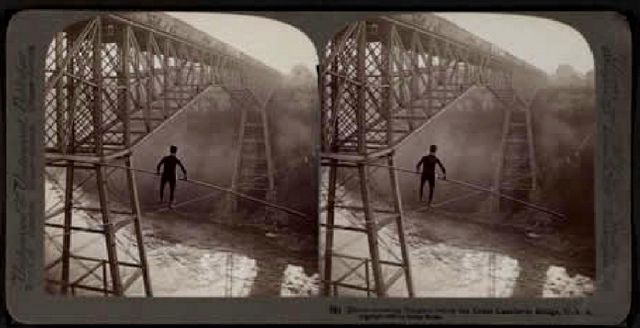
“Public Eye: 175 Years of Sharing Photography” Photo via NYPL
“Public Eye: 175 Years of Sharing Photography” is a look back at photographs from the past, and a look at some of the platforms we use to share photographs today, such as the use of streets as a venue for photography, and moving forward with this art form into the risky business of loosing our privacy. The exhibit explores various ways photography has been shared and made public. Two categories that caught our attention were ‘Stereogranimator: View, Create and Share 3D Images and On Broadway, which represents digital traces of life collected along the thirteen miles of Broadway. “Public Eye: 175 Years of Sharing Photography” is located at the New York Public Library, Stephen A. Schwarzman Building, Fifth Avenue at 42nd Street. The exhibit ends January 3.
3. A Signpost and a Crescent Moon Arrive at First Street Green Art Park
Artist Henry Kielmanowicz “The Space Between Us” at the First Street Park. Photo via NYC Parks
Two new installations in the First Street Green Art Park caught our eye. Henry Kielmanowicz is a sculpture artist with a focus on creating sculptures from manmade objects that enter our waste cycle everyday. In his installation “The Space Between Us,” he created a crescent-shaped moon with a new raw material made by breaking, crushing and separating glass into multiple sizes. The crescent moon sculpture sits on a steel curved frame, ten feet high above the parks mural wall. Inside the recycled glass are LED light bulbs, powered by solar panels, which give the installation a green glow at night. “The Space Between Us” will be on view through May 2016.
Also located in the First Street Green Art Park is the installation “Signpost” by Australian-based artist, Stuart Ringholt. Here, you will stop and give thought to a range of emotions that include greed, happiness, sadness, anger, lust, depression, love, sleep, envy and sadness. This public art project is in conjunction with his exhibit at OSMOS Address, 50 East 1st Street, which is in partnership with NYC Parks. We should mention that the OSMOS Address space has a storied history as a saloon frequented by radicals such as Emma Goldman, Ambrose Bierce, and many others who used the saloon as their mailing address. Goldman once called the tavern “the most famous radical center in New York.”
In 2012, the site and original owner Justus H. Schwab (1847-1900) were recognized by the Greenwich Village Society for Historic Preservation for historic significance. The tiny space measuring just eight feet wide and thirty feet deep was often targeted by the temperance movement and raided by the police.
“Signpost” by artist Stuart Ringholt at the First Street Park. Photo via NYC Parks
“Signpost” will be on view at the First Street Green Art Park through May 3, 2016. The First Street Green Park is located on Houston Street, between 2nd and 1st Avenues.
2. Photographer George Steinmetz Exhibits New York From Above

The Christmas tree at Rockefeller Center as seen from the roof of Saks Fifth Avenue. Photo by George Steinmetz
George Steinmetz is best known for his exploration photography. As a regular contributor to National Geographic and GEO Magazine, he set out to discover the few remaining secrets in our world today, such as remote deserts and obscure cultures. It was of great interest to learn that he set his lens on New York, and in particular, New York from up above.
His current exhibit and accompanying book, “New York Air,” is a spectacular view of our parks, rooftops and massive infrastructure. Steinmetz captures iconic places like Central Park, Times Square, the High Line and One World Trade Center. He captures New Yorkers going about their daily lives, at work and at play, sunbathing on the Sheep Meadow in Central Park, ice skating at Wollman Rink and soaking up the sun in Coney Island.
“New York Air” will be on view through January 31, 2016 at Anastasia Photo, 143 Ludlow Street. His book can also be purchased as the gallery.
1. Marvin Koner Brings the Hope of A New Land…New Life With His Photographs From 1957

As the United States moves deeper into discussion on the subject of immigration, a photographic essay from the 1950s has re-emerged. The exhibit “New Land…New Life, An Italian Family’s Migration to America,” is a series of vintage photographs by American photojournalist, Marvin Koner (1921-1983), on view at the Keith De Lellis Gallery. Koner, who is best known for his portraits of entertainers in publications like LIFE, Esquire, and Pageant Magazine, was also known for his photographs capturing the struggles and triumphs of the immigrant population. In 1957, Koner traveled to Lucera, Italy to document Carmela De Maria and her three children, as they readied themselves for the long journey to America to be reunited with her husband.
The exhibit “New Land…New Life, An Italian Family’s Migration to America” will be on view through January 16, 2016 at Keith De Lellis Gallery, 1045 Madison Avenue at 80th Street, 3rd floor.
There is still time to view Fata Morgana, Against the Run, Jacob A. Riis and Affordable New York, along with Luminaries at Brookfield Place, SOFTlab at the Flatiron Public Plaza and Moshe Safdie at The National Academy Museum. And If You Leave Me Can I Come Too? at Hunter East Harlem and Christo at Craig F. Starr Gallery. Get in touch with the author at AFineLyne.

